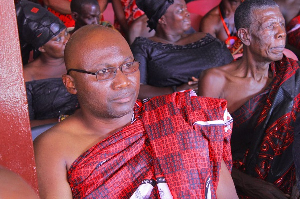- Home - News
- TWI News | TV
- Polls
- Year In Review
- News Archive
- Crime & Punishment
- Politics
- Regional
- Editorial
- Health
- Ghanaians Abroad
- Tabloid
- Africa
- Religion
- Election 2020
- Coronavirus
- News Videos | TV
- Photo Archives
- News Headlines
- Press Release
Opinions of Monday, 1 July 2019
Columnist: Hanson Agyemang
Hanson Agyemang writes: Govt’s passive way of dealing with Ponzi schemes killing Ghanaians
Ghana has had to deal with several suspected cases of Ponzi schemes recently.
Mention can be made of the DKM saga in the then Brong Ahafo Region, Pyram, the Global Coin Community Help Group, the Menzgold case and the recently emanating issues from El Real Estate Investments owned by the head pastor of Zoe Outreach Embassy, appear to be pointing to a similar direction.
Ponzi scheme operates as a form of fraud where earlier investors get to benefit from the investments of recent investors. The scheme is named after Charles Ponzi who used it in the 1920s to defraud his investors to the tune of some $20 million. Characteristic of Ponzi schemes is the high returns on investments with little or no risks.
Such schemes have a tendency of crippling economies when they are not attended to early. But the rate at which such cases frequently hit the media space is not as alarming to me as government’s response to the situation.
Successive governments seem to have taken a position that shifts all responsibility onto victims of these schemes. The argument by central government has been that the victims were cautioned not to engage in such schemes. It has on that basis remained adamant in cracking the whip in most instances.
A stance I find disturbing! There exists a reason we say governments have a social contract with their citizens. Even though Thomas Hobbes and John Locke disagreed on the extent of powers to be conferred on the Monarch — here government, — they agreed on governments exercising certain powers to maintain order in society and protect their citizens. They acknowledged that human nature is susceptible to all kinds of wrongs. Hobbes in particular, describes human nature as being selfish. He makes a case for the need for government to avert any negative impact of this selfish nature of man.
Government’s approach in dealing with Ponzi schemes seems to be betraying the arguments for which the early scholars of political science pushed for the existence of State power. Government might be right in its observation that people are duped because of their own greed, but that doesn’t stop it from taking the necessary steps to protect its citizens. What we have come to realize is that when Ponzi schemes are identified, the only action taken by government is the closure of these organizations without due recourse to the retrieval of the funds of customers.
Perhaps government is not seeing the devastating effects of this phenomenon. In my few days of covering Ponzi scheme related stories as a journalist, I have come to realize the physical and mental impacts of the failures of these entities on the lives of their victims. For a number of these victims, their entire life savings have been locked up which has left them hopeless. I once met a young man in his early thirties who had sold two taxis and put his entire gains into Menzgold. The stories of people who used to live comfortably and have now turned paupers over night because of similar instances, abound.
There were those who were angered by the issue to the extent that they kept making threats of carrying out violent attacks on owners of the scheme and even government appointees. I have witnessed violence displayed by some of these victims. Even journalists who are nowhere near the responsibility chain were chased and beaten. You can only imagine what that means if all these affected victims get to this point due to the hardships they are enduring to carry out some of their threats.
I am not saying government should pay back the locked up funds of these investors. But when we decide to close down a suspected Ponzi scheme, we should have a plan through which the locked up funds will be retrieved. If for nothing at all, the State can begin some prosecutions of masterminds of these schemes. Not only will it serve as deterrence, it will act as an alternate satisfaction for the victims knowing that at least they have received some level of justice.
The government through state institutions must be proactive in dealing with some of these cases. In the case of Menzgold, we sat aloof, watched one company change its name and style of operations for about 6 times in less than four years. And when the Securities and Exchange Commission realized the non-compliance of the company to some statutory laws; the appropriate sanctions were not even applied. Till date, the SEC has not been able to give out any relevant punitive measure to management of the company for perpetuating an illegality. Months ago, there was information that the State was after the directors of the company. After the initial media frenzy, little has been heard of it and the State has been tight-lipped.
The disturbing issue in all these Ponzi scheme-related issues is the fact that authorities become aware of these companies after they are through with defrauding Ghanaians. It questions the oversight responsibility played by State institutions created by law to oversee the sector. One begins to wonder the kind of monitoring undertaken by the agencies we fund with tax payers’ money. State agencies will have to be pragmatic and move away from the caution games.
We also have to acknowledge the modernization of the financial systems in the world today. We need to upgrade the skills of our monitoring agencies to enable them deal with new trends in global finance and the concomitant fraud that may come along with the development.
We have recently recorded cases where State institutions have literally told Ghanaians that they should not be part of an investment scheme just because the regulator has no idea of how the system works. Even though those statements may be honest moves, how do we want to sound convincing when we are not able to relay logical arguments against some of these schemes.
Finally, government needs to be concerned about the level of financial literacy in the country. A look at the victims of all cases of Ponzi schemes will reveal that the victims cut across various sections of society whether literate or illiterate. Conscious efforts must be made to improve financial literacy. Perhaps attaining this will save government the problems of having to deal with Ghanaians asking for a refund of their locked up investments.











